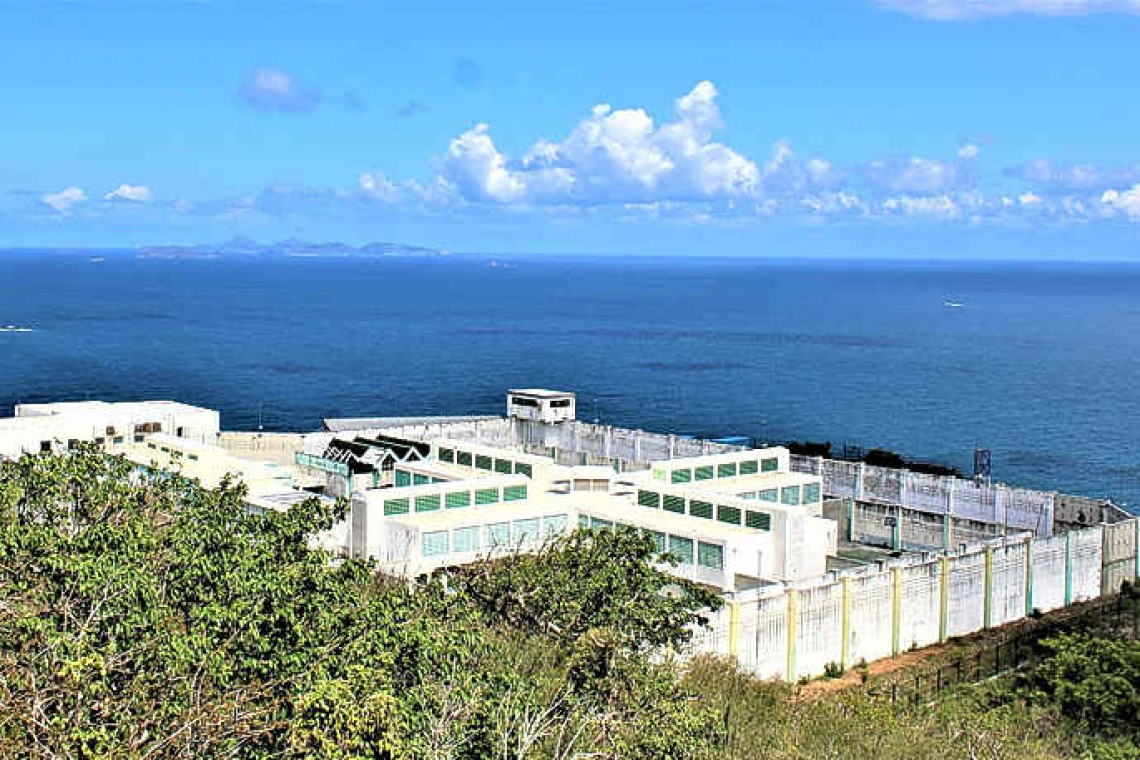PHILIPSBURG--The United Nations Office for Project Services (UNOPS) is preparing to officially begin construction of the new prison facility in Pointe Blanche, marking a major step forward in St. Maarten’s long-awaited justice sector reform. Justice Minister Nathalie Tackling made the announcement during Wednesday’s Council of Ministers press briefing.
Tackling said more details about the project will be released in the coming days. The St. Maarten Rule of Law Facilities Project includes a range of essential upgrades and new infrastructure, such as a pre-trial detention ward, enhanced male and female sections, educational and training facilities, health and dental consultation rooms, psychological support offices, recreational spaces, and modern staff areas.
The new facility will also feature strengthened security systems, including panoramic and static surveillance cameras, aimed at improving both inmate management and staff safety.
Minister Tackling clarified figures previously shared regarding unserved sentences. She confirmed that the figure of 300 refers to years of imprisonment, not individuals. “That number was communicated by the Prosecutor’s Office, which is responsible for executing prison sentences,” she explained. “If you add up all the years of sentences awaiting execution, it’s currently around 300 to 400 years.”
The minister also outlined the current capacity at the Pointe Blanche facility, which can accommodate 80 men and 6 women, in addition to 15 police cells that may only be used for a maximum of ten days under the law.
Under the new project, prison capacity will nearly double in phases. Phase One, expected to be completed in the first quarter of 2027, will expand capacity from 80 to 120 cells. Phase Two, planned for 2028, will bring the total to 196 cells.
“That figure was based on projected crime trends, regional benchmarks, and what the country can afford,” Minister Tackling said, noting that earlier reports had suggested the need for about 300 cells – a figure deemed financially unsustainable.
The lack of capacity has long posed challenges for law enforcement, with some officers expressing frustration that limited space discourages the pursuit of minor offences. Tackling acknowledged this concern, saying that the issue is not only about prison space but also about broader resource limitations.
“Ideally, every criminal action should have consequences,” she said. “We’ve asked the Netherlands for technical support to increase detective capacity so we can also address smaller crimes before they escalate.”
According to Tackling, the shortage of prison space has persisted since Hurricane Irma severely damaged the facility in 2017, compounded by court rulings and human rights standards that restrict use. “It’s a long-term challenge, not a recent one,” she said.
The minister also provided an update on crime statistics, noting that reports are still being finalized. “We have data through the end of last year showing that armed robberies were higher in 2024 than so far in 2025,” she said. “However, we’ve noticed a shift – more jewellery stores and hotels are being targeted. These are high-visibility crimes that create greater public concern.”
Tackling added that a strategic plan for the high tourist season is being prepared, involving coordination between police, immigration, customs, and other law enforcement agencies.
In response to a suggestion from an inmate about involving prisoners in community programs, such as preparing food for school feeding initiatives, Tackling said she supports such ideas. “We’ve looked at similar programs elsewhere – Bonaire, for example, has inmates making sandwiches for schools,” she said. “We’re studying how we can implement something like that here as part of our rehabilitation efforts with UNODC.”
The minister also addressed reports that inmate therapy programs were paused due to unpaid balances to service providers. “That’s true, and it’s one of my top priorities,” she confirmed. “We’re working with those organizations to address the outstanding payments and establish payment plans. We’ve also secured funding for a baseline study to assess the mental health and rehabilitation needs of inmates.”
A full-time UNODC program manager has already been assigned to St. Maarten to coordinate these initiatives, Tackling said. “Even before the new prison opens, it’s essential that rehabilitation begins now. We want to give inmates real opportunities for growth and reintegration,” she emphasized.
“Progress can feel slow,” Tackling concluded, “but every step forward counts. We’re committed to doing this the right way – for justice, for safety, and for the people of St. Maarten.”







